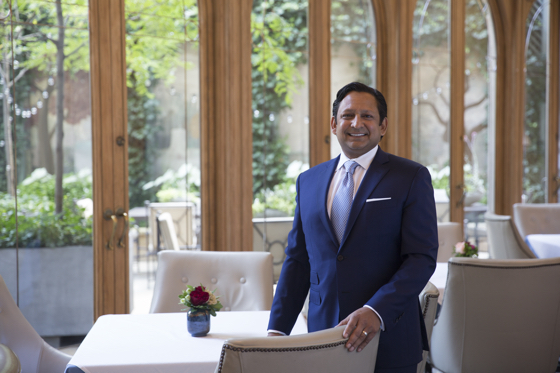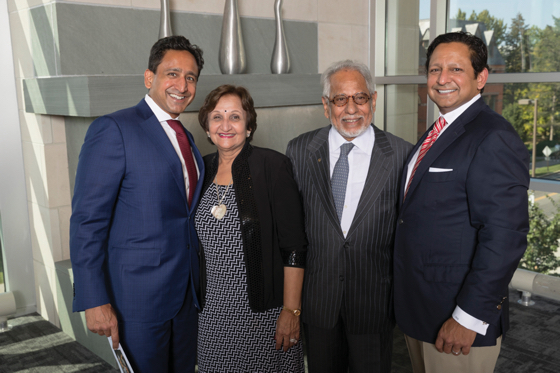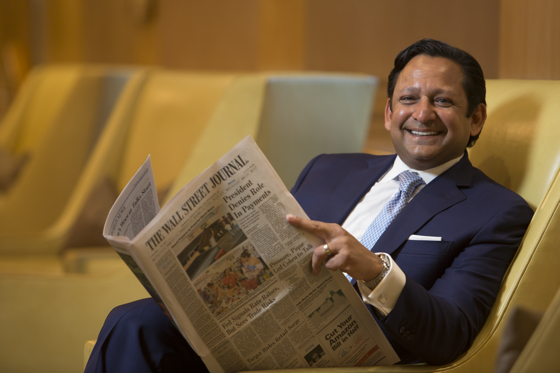Jay Shah likes to tell a story about when he was in third grade in the 1970s, riding in the front seat with his father heading to auctions near Harrisburg, Pennsylvania, to buy foreclosed home mortgages. He would listen as Hasu thought out loud about capital gains, how to build principal and equity. He remembers tearing out back doors of those beat-up, newly acquired houses and framing them for sliding doors, and getting on the roof with his dad and swinging a hammer to put on new shingles.
“They were really fun times. It was so exciting. It was very vital because we had a plan,” Shah recalls. “I didn’t realize how important that was.”
Jay Shah is the winner of HOTELS 2018 Corporate Hotelier of the World award, joining Philippe Leboeuf as the 2018 Independent Hotelier of the World
Shah gets equally nostalgic and reverent when he talks about his mother, Hersha – who he calls the real hospitality person in the family, and the namesake of the publically traded REIT, Hersha Hospitality Trust, that he has led since 2006 as CEO. “She’s the most gracious lady you’ll ever meet. She’s just lovely, and she’s got the EQ (emotional intelligence) of five people combined,” he says.
Shah’s parents have a love story that started during their childhoods in India, before Hasu married Hersha and brought her to settle in the United States. It is the values they instilled in Shah and his brother that are honored and followed to this day out of respect and the knowledge that the plans set in motion so many years ago worked. They never take it for granted.
Those third-grade car rides eventually led to the acquisition of a few motels in tertiary markets of Pennsylvania, further instilling the values of hospitality and hard work when sixth grade-Jay was checking in guests and finding the perfect angle for guest room TV antennas.
“I remember my dad telling me, ‘I think we should buy a motel.’ I asked, ‘Why, dad?’ And he said, ‘Because there’s cash flow coming from the business. The cash flow will pay the mortgage. That will amortize until you grow equity.’ That was very simple,” Shah says. It didn’t hurt that after fixing up the first property, his mother won a contract with a truck-driving school that kept the motel 100% occupied for nine months of the year.
“It was a very happy time because we were accomplishing something,” Shah says, adding that his younger brother, Neil, Hersha’s president and chief operating officer, still refers to an unattributed, often-cited family quote, “A small group of people facing the same direction can change the world.”
Long story short, sticking to the plan led Shah, by then a lawyer, to join the family business in the late 1990s and launch a small hotel REIT with six limited-service hotels and a market capitalization of maybe US$50 million – barely receiving any attention from Wall Street.
Since then, good fortune, hard work and a very fortuitous decision to pivot the portfolio toward limited-service developments in major East Coast metro markets has moved Hersha Hospitality Trust into the big time, with luxury properties, like its flagship Rittenhouse near company headquarters in Philadelphia, part of the mix. Today, the company owns 49 hotels and 7,666 rooms with an enterprise value north of US$2.5 billion. Hersha continues to recycle capital, upgrade the quality of its portfolio to generate robust cash flow and grow its percentage of the public float.
Shah says the only person who understood Hersha’s new urban strategy was Steve Rushmore, founder of HVS, as too many people thought they couldn’t get a rate premium close to full-service hotels. “Our view was, if you built a purpose-built, 3-star hotel, you were able to tag along within a 15% to 20% discount of the full-service guys,” Shah says. “It turned out we were right, because when we opened that first Hampton Inn in New York City it was running with the rate premium and 90% occupancy in the second month.”
Shah says his father might not have taught him how to throw a curveball, but he gave him an incredible lesson in entrepreneurship and leadership, while his mother grounded him in the art of service. “We do love hospitality in our family. It’s a big deal,” he says.
All of this and more helped lead the readers of HOTELS select Shah as 2018 Corporate Hotelier of the World, and proudly becoming the first Asian American to win the award.
No shortcuts
The family and business flourished because of classic values and simple hard work. In fact, at Shah’s alma mater, Cornell University, a central classroom dubbed the Hersha Center honors Hasu and Hersha Shah with a plaque that reads, “There’s no greater dignity than that found in service.” As Shah puts it, “the dignified serving the dignified.”
To serve with dignity is a great thing, he adds. “That sense of hospitality is essential in this business. You can’t just be a financial momentum player. You can’t build a sustainable business that way. That’s great for a quick five-year hit if you’re a private equity guy. But it’s hard to build a company on that.”
Shah also prefers to lead with values because a company grounded in values works better. “I feel like there’s a collapse of time, and if you don’t have a strong set of values people are going to be more apt to lose their way, just because the pace of change is fast,” he says. “Sometimes the speed at which things change may inadvertently cause too many people to place their ethics on the side.”
Friend and contemporary Homi Vazifdar, CEO of Canyon Equity in Larkspur, California, adds, “There are a lot of very successful people at the helms of large organizations in our industry, but what distinguishes Jay Shah from the pack is just not his vigor and work ethic as a leader, which is unquestioned, but it is his sense of decency, his humility, his integrity and his ability to actually run Hersha Hospitality as a close-knit family, which is an extremely rare trait in a public company.”
Another competitive advantage central to Hersha’s success, according to Shah, is its rigor. That was instilled by Hasu and helped Jay and Neil guide the group through the financial downturn of 2008 and 2009. “I’m very curious and intellectually rigorous,” Shah says. “I’m curious about everything. I’ll go down a five-mile rat hole to understand the early medieval sewer system of Berlin. I’m a little nerdy like that.”
That rigor has also led Hersha to be very thoughtful and deliberate not only in developing its strategy but in how it executes and shows up every day. “I don’t know if it comes from our heritage, but it was always about being a gentleman and getting to a win-win, with rigor… Everyone needs to be rigorous, but it is about getting to a win-win, and that’s a great way to stay even-keeled,” Shah says.
Neil Shah credits his brother with leading Hersha through the financial crisis with his workmanlike approach. “It was something to plow through and make hard decisions,” Neil Shah says. “It was financially painful and personally impactful. Jay’s a world-class communicator and in those gritty meetings with the contractors, operator, lender, auditor or shareholders, Jay helped us all articulate and execute at our most challenging time. Jay personally demonstrated that you show up, roll up your sleeves and own it.”
Jay Shah’s ongoing conversations with his brother address important decisions where they will actually end up flipping their positions, calling it healthy and part of the discourse that regularly happens among the Hersha leadership team. “Good things don’t happen without rigor. It’s just not sustainable,” Shah says. “We’re tough on ourselves and our actions. We’re not tough on people, but we’re tough on thinking.”
What makes rigor even more important to Hersha: It also has a separate management company, HHM, on top of the publically traded real estate business. In total, Shah estimates the enterprises have close to 8,000 employees. “So you have (these) businesses going and I always say, ‘It’s three ways to generate value, but it’s always three ways to get smoked if you don’t know what you’re doing.’ There’s no upside that doesn’t come without a risk.”
Jack of all trades
Having achieved so much financial success, what inspires Shah today most is growing his team. “I ask more questions than I give mandates,” he says. “You bring people along to get to the same answer by asking questions… Then, you’ve helped them figure it out on their own.”

“Jay’s management style with his direct reports is always respectful, always listening and trying to drive for what is best for Hersha,” says Jackson Hsieh, who sits on the Hersha board of director and years earlier led a re-IPO when he was Hersha’s banker at UBS. “The other thing most notable about Jay is that he is very calm in the heat of the moment.”
Shah is able to lead with empathy because he has worked every aspect of operations, including a stint with a drunk breakfast line cook at one of the original motels. “With a styrofoam cup full of rum and Coke at 5 a.m.,” Shah recalls with a grin. “But he taught me how to flip an over-easy egg without using a spatula because you don’t have time for a spatula. OK, you break a couple when you’re doing that, and then he would yell. But I can do that.”
“Jay’s greatest strength is his ability to thinks as a hotelier, developer and an owner at various times in the same day or even a single meeting,” says brother Neil. “And it’s not transitory, thousand-foot level observations – but the insights from years of being a desk agent, bartender, sales director, practicing attorney representing entrepreneurs raising capital, tax and real estate consultant, building a management company from scratch, developing hotels from the ground up in big cities, leading our family and partners to an IPO, and then building a US$3 billion hotel portfolio. That’s a wide range of deep work across four cycles and cultivated his greatest strength in business.”
Shah also learned how to work well with his brother. “My working relationship with Neil is one of the secrets to our success as we really approach things as partners,” he says. “But having two different points of view is a really good thing. Otherwise, you’re making a lot of these decisions and trying to balance things in your head.”
Finding Shanti
Having turned 50 this year, Shah says he has found a new sense of shanti (Hindu for calm) that has him considering what else he wants to accomplish beyond guiding Hersha with a steady hand. Along with his wife of 24 years, Susie, they have named and branded a concept called “One-Room Schoolhouse” with plans to go into underserved communities in Africa and India to develop one-room schoolhouses. Students would gain the skills to get a job even at the semi-skilled level, and the building would also serve as the center of village government and as a community center. “We actually want to help build these ourselves. It’s a way for us to see the world and meet people,” he says.
With his twins off to college, Shah’s other dream is authorship of a great novel. He has gone to a few writers’ workshops and would love to commit the time to it and put out “something amazing.” “I’m thinking through a lot of things, to be quite honest with you,” he says. No doubt, with much rigor.

Jay Shah file
- Born July 17, 1968
- Parents Hasu and Hersha Shah bought their first property, the Starlite Motel near Harrisburg, Pennsylvania, in 1978, followed by the Red Rose motel, where Jay would make up rooms, help with laundry and check in guests on Saturday night.
- In 1990, he earned a bachelor’s degree from the Cornell University School of Hotel Administration, followed by an MBA and a JD from the Fox School of Business and Beasley School of Law at Temple University.
- On August 20, 1994, he married Susie Shah and subsequently had twins, daughter Aryana and son Avikar.
- Until 1999 he was founder and principal at Shah Ray & Byler, a boutique real estate and construction law firm based in Philadelphia.
- From 1999 to 2003, he served as managing director of the Hersha Group, a hotel development, ownership and management organization with 20 hotels in the northeastern United States and was intimately involved in the operational and transactional activities of the group’s regional real estate development and management company.
- On January 1, 2006, he became CEO at Hersha Hospitality Trust after serving as president and chief operating officer from September 2003 to December 2005.
- Served on the Board of Trustees of the Please Touch Museum, the Philadelphia Children’s Museum.


